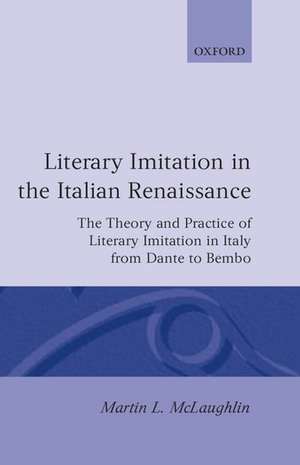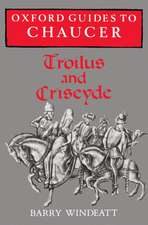Literary Imitation in the Italian Renaissance: The Theory and Practice of Literary Imitation in Italy from Dante to Bembo: Oxford Modern Languages and Literature Monographs
Autor Martin L. McLaughlinen Limba Engleză Hardback – 28 mar 1996
Din seria Oxford Modern Languages and Literature Monographs
- 28%
 Preț: 498.33 lei
Preț: 498.33 lei - 28%
 Preț: 403.98 lei
Preț: 403.98 lei - 23%
 Preț: 472.87 lei
Preț: 472.87 lei - 28%
 Preț: 498.56 lei
Preț: 498.56 lei - 30%
 Preț: 529.12 lei
Preț: 529.12 lei - 27%
 Preț: 488.30 lei
Preț: 488.30 lei - 16%
 Preț: 471.17 lei
Preț: 471.17 lei - 16%
 Preț: 472.12 lei
Preț: 472.12 lei - 34%
 Preț: 1196.78 lei
Preț: 1196.78 lei - 34%
 Preț: 844.61 lei
Preț: 844.61 lei - 37%
 Preț: 875.43 lei
Preț: 875.43 lei - 34%
 Preț: 550.53 lei
Preț: 550.53 lei - 31%
 Preț: 339.43 lei
Preț: 339.43 lei - 34%
 Preț: 946.68 lei
Preț: 946.68 lei - 34%
 Preț: 977.57 lei
Preț: 977.57 lei - 31%
 Preț: 713.96 lei
Preț: 713.96 lei - 46%
 Preț: 447.51 lei
Preț: 447.51 lei - 47%
 Preț: 656.78 lei
Preț: 656.78 lei - 38%
 Preț: 327.25 lei
Preț: 327.25 lei - 34%
 Preț: 1169.33 lei
Preț: 1169.33 lei - 34%
 Preț: 1167.71 lei
Preț: 1167.71 lei - 34%
 Preț: 848.33 lei
Preț: 848.33 lei - 31%
 Preț: 861.06 lei
Preț: 861.06 lei - 27%
 Preț: 190.60 lei
Preț: 190.60 lei - 31%
 Preț: 364.22 lei
Preț: 364.22 lei - 23%
 Preț: 275.97 lei
Preț: 275.97 lei - 31%
 Preț: 786.79 lei
Preț: 786.79 lei - 34%
 Preț: 1167.72 lei
Preț: 1167.72 lei - 45%
 Preț: 468.18 lei
Preț: 468.18 lei - 34%
 Preț: 1109.57 lei
Preț: 1109.57 lei - 34%
 Preț: 1079.86 lei
Preț: 1079.86 lei - 30%
 Preț: 699.95 lei
Preț: 699.95 lei - 30%
 Preț: 628.12 lei
Preț: 628.12 lei - 34%
 Preț: 935.68 lei
Preț: 935.68 lei - 31%
 Preț: 625.03 lei
Preț: 625.03 lei - 34%
 Preț: 991.94 lei
Preț: 991.94 lei - 34%
 Preț: 816.41 lei
Preț: 816.41 lei - 34%
 Preț: 829.26 lei
Preț: 829.26 lei - 30%
 Preț: 773.81 lei
Preț: 773.81 lei - 34%
 Preț: 530.01 lei
Preț: 530.01 lei - 30%
 Preț: 658.73 lei
Preț: 658.73 lei - 34%
 Preț: 846.29 lei
Preț: 846.29 lei - 31%
 Preț: 802.74 lei
Preț: 802.74 lei - 34%
 Preț: 1034.42 lei
Preț: 1034.42 lei - 34%
 Preț: 1254.44 lei
Preț: 1254.44 lei - 31%
 Preț: 387.21 lei
Preț: 387.21 lei - 51%
 Preț: 699.57 lei
Preț: 699.57 lei - 28%
 Preț: 462.34 lei
Preț: 462.34 lei - 34%
 Preț: 947.44 lei
Preț: 947.44 lei - 34%
 Preț: 887.47 lei
Preț: 887.47 lei
Preț: 1038.05 lei
Preț vechi: 1577.60 lei
-34% Nou
Puncte Express: 1557
Preț estimativ în valută:
198.66€ • 206.63$ • 164.00£
198.66€ • 206.63$ • 164.00£
Carte tipărită la comandă
Livrare economică 03-09 aprilie
Preluare comenzi: 021 569.72.76
Specificații
ISBN-13: 9780198158998
ISBN-10: 0198158998
Pagini: 322
Dimensiuni: 147 x 224 x 24 mm
Greutate: 0.59 kg
Editura: Clarendon Press
Colecția Clarendon Press
Seria Oxford Modern Languages and Literature Monographs
Locul publicării:Oxford, United Kingdom
ISBN-10: 0198158998
Pagini: 322
Dimensiuni: 147 x 224 x 24 mm
Greutate: 0.59 kg
Editura: Clarendon Press
Colecția Clarendon Press
Seria Oxford Modern Languages and Literature Monographs
Locul publicării:Oxford, United Kingdom
Recenzii
an excellent scholarly study.
important study ... Scope is a significant feature of this book, in two areas particularly. The study pushes Weinberg's periodization of literary theory much further into the past, allowing for a historical conspectus which is particularly interesting in the early period ... The other great merit of the book is the dual perspective between classical scholarship and the vernacular. McLaughlin's translations from Latin, especially, have a freshness and fluency which really does justice to the living thought and personality of the originals
important study ... Scope is a significant feature of this book, in two areas particularly. The study pushes Weinberg's periodization of literary theory much further into the past, allowing for a historical conspectus which is particularly interesting in the early period ... The other great merit of the book is the dual perspective between classical scholarship and the vernacular. McLaughlin's translations from Latin, especially, have a freshness and fluency which really does justice to the living thought and personality of the originals















